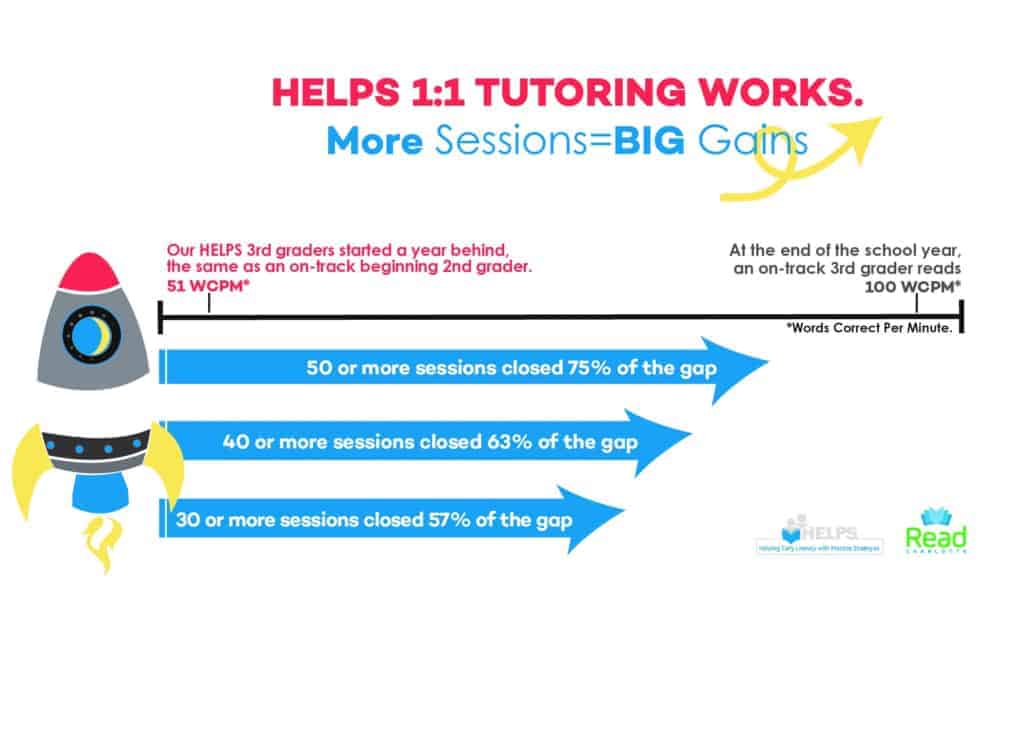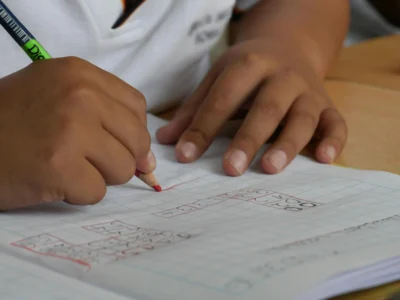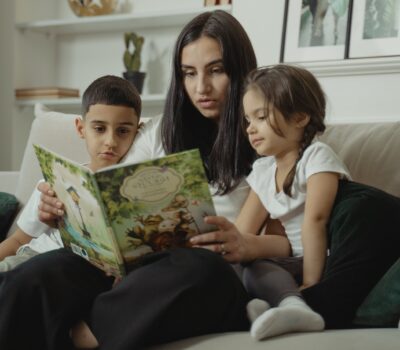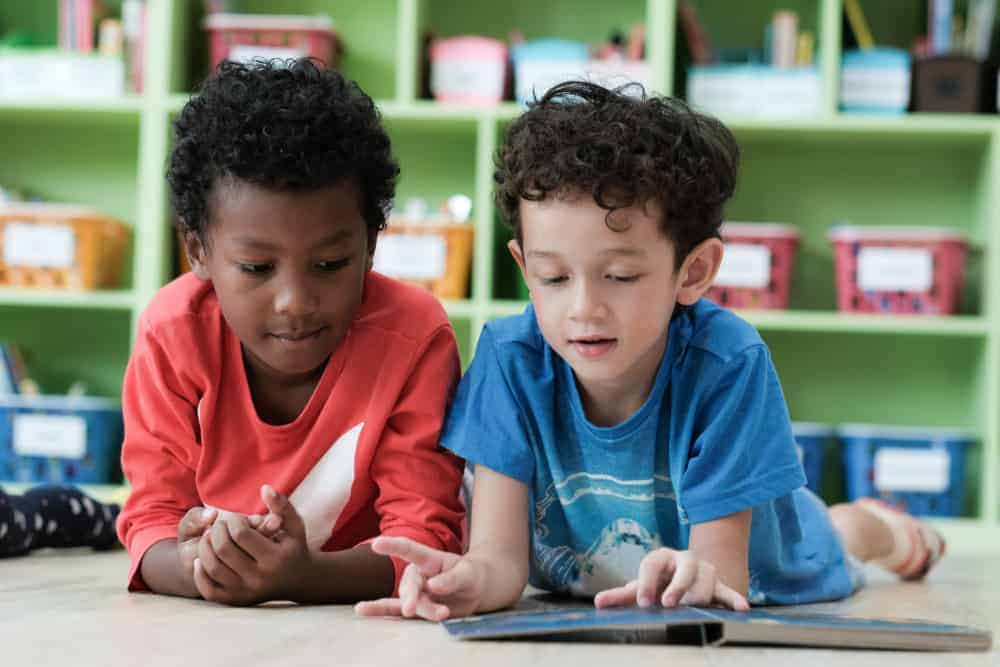For the past six years, the state of North Carolina has focused on improving third grade reading proficiency under the Read to Achieve initiative. Despite our best efforts, third grade test scores have proven difficult to improve. At Read Charlotte, we think a partial solution to this problem is a targeted focus on reading fluency.
Fluency is the ability to read with speed, accuracy, and proper expression. Research finds strong connections between reading fluency, comprehension and overall reading achievement. When a child is a fluent reader, they can focus on processing meaning rather than identifying words. An analysis of third-graders in Charlotte-Mecklenburg Schools (CMS), conducted by a researcher in the district’s accountability office, found a 79% correlation between 2018 third grade end of year DIBELS Oral Reading Fluency (DORF) scores and performance on the North Carolina end of grade (EOG) reading assessment.
At Read Charlotte, we estimate that we could improve third grade reading proficiency by as much as 20 percentage points with a targeted focus on reading fluency in second and third grade. Yet, despite its importance, fluency is often referred to as the “forgotten literacy skill” compared to letter knowledge, phonemic awareness, phonics, and comprehension.
Fortunately, North Carolina has a homegrown answer to this problem. HELPS (Helping Early Literacy with Practice Strategies) is an evidence-based, research-validated reading fluency program developed by Professor John Begeny of North Carolina State University. HELPS is a recommended intervention in the practice guide for K-3 foundational literacy skills published by the U.S. Department of Education’s What Works Clearinghouse. Five randomized controlled studies have demonstrated its efficacy. It is unusual for a literacy intervention to be meticulously evaluated so many times — especially when you consider that many literacy interventions have never been rigorously tested.
Students receive three, 15-20 minute scripted HELPS tutoring sessions each week. This structure makes it easier to fit HELPS within schools’ intervention blocks. HELPS is ideal for students who have mastered a minimum level of phonics but don’t read with enough speed or accuracy to fully comprehend what they are reading. In 2010, Begeny created the nonprofit Helps Education Fund to disseminate the program. Because he believes strongly in educational equity, Begeny makes the core program materials freely available online.
After “kicking the tires” on HELPS, Read Charlotte partnered with Charlotte-Mecklenburg Schools, the Helps Education Fund, and a host of community partners to bring HELPS to Mecklenburg County in the 2018-2019 school year. HELPS is the rare literacy intervention that can be delivered effectively by trained teachers, teacher assistants, and volunteers alike.
Volunteers received an initial 3.5 hour training and additional coaching during their initial tutoring sessions. Local philanthropic funding helped to provide extra support for quality implementation. Volunteers tutored for about 45-60 minutes each week, working with two or three students during that time for 15-20 minute tutoring sessions. Individual students received HELPS tutoring from two or three different adults over the course of a week.
In total, 155 third graders in 10 elementary schools received HELPS tutoring from teachers and trained volunteers during the 2018-2019 school year. We used DIBELS Oral Reading Fluency scores to select students for the program and track their progress during the school year. The average third grader who received HELPS tutoring started the school year in fall 2018 reading 51 words correct per minute — the equivalent of a beginning second grader. To catch up by the end of third grade, these students needed to grow their fluency enough to read at least 100 words correct per minute — about double the normal growth rate for third graders.
The good news is HELPS works. On average, the more tutoring that students received, the more they improved their reading fluency. Students who received at least 50 HELPS fluency tutoring sessions benefited the most and closed 75% of this gap. This is the equivalent of growing just over 1.5 grade levels in reading fluency in a single year.

I personally saw the impact of HELPS up close as I tutored two third grade boys each Monday last school year. Both were native Spanish speakers. Week after week, I saw the boys increase their confidence as readers as they worked their way through the HELPS reading passages. I “shared” these two boys with Johanna Anderson, executive director of The Belk Foundation, who tutored them on Wednesdays, and my wife Teresa, who tutored on Fridays.
In an end-of-year tutor survey, 92% of HELPS tutors said they were satisfied with the experience.
“It was exhilarating to see real improvement in the reading fluency of the kids with whom I worked in HELPS,” said George Miles, a volunteer and retired IT professional. “The kids were also excited at their improvement, and it is such an incredible feeling to see them excited about learning!”
Read Charlotte is partnering with Charlotte-Mecklenburg Schools and the Helps Education Fund to strategically expand HELPS in the 2019-2020 school year. It’s part of a larger initiative by Read Charlotte to mobilize the community around a coordinated set of “stacked and aligned” evidence-based strategies starting at birth to improve third grade reading proficiency. We’re on track to more than double the number of students tutored with HELPS this school year and are focusing on second and third graders.
Based upon the first-year results, we want to make sure that all participating students get at least 50 HELPS sessions in the coming school year. The partnership of schools, the faith community, businesses, higher education, community groups, and individuals volunteering provide enough tutoring to move the needle. The leaders of a number of companies in Charlotte are really stepping up this school year to encourage their employees to volunteer as HELPS tutors. Local houses of worship, which were the backbone of our effort in the first year, continue to support the effort. And we are developing new partnerships with local colleges and universities in Mecklenburg County to engage federal work-study students as paid tutors.
Our experience with HELPS convinced colleagues in Guilford County to implement the program this school year in several elementary schools. We know colleagues in Durham County are also considering HELPS. With the right backing for the Helps Education Fund, support from school districts, and a dedicated pool of local volunteers, we believe this effective program could be scaled to benefit students across the state of North Carolina.
Editor’s note: The Belk Foundation supports the work of EducationNC.
Recommended reading




